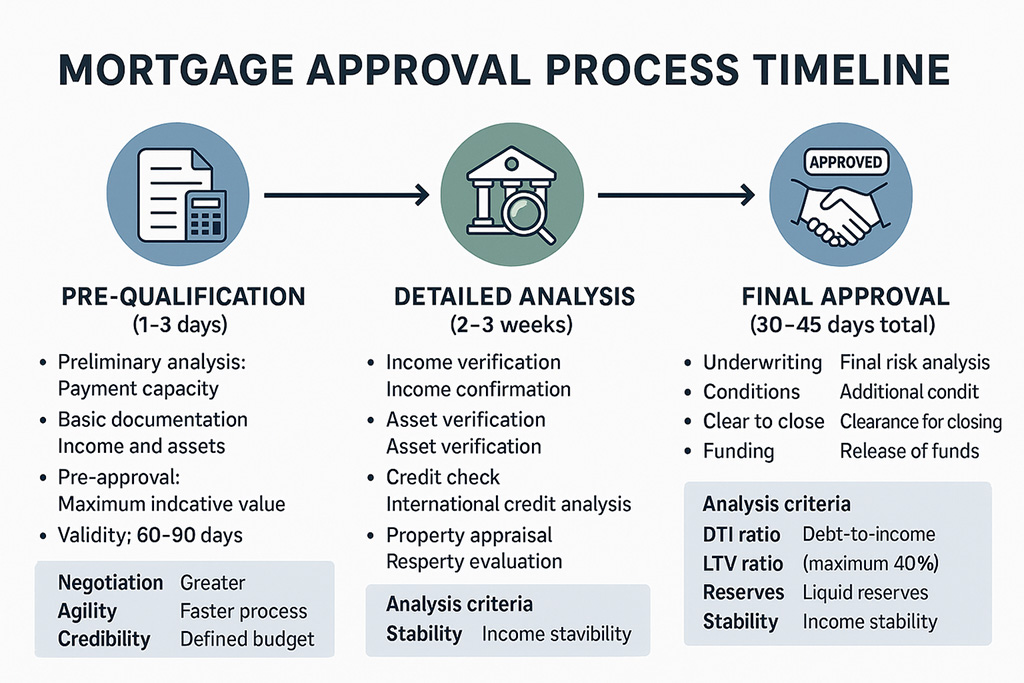Obtaining mortgage financing in Miami as a foreigner is more accessible than many imagine. With the right strategies, proper documentation, and knowledge of available programs, international investors can access competitive credit to maximize their purchasing power and optimize returns.
Mortgage financing for foreigners in Miami represents a real and accessible opportunity to maximize purchasing power and optimize investment returns. Contrary to what many believe, there are specific programs and specialized banks that offer competitive conditions for international investors.
This comprehensive guide explores all available options, from traditional American banks to international institutions, detailing requirements, approval strategies, and practical tips to obtain the best conditions. With the right knowledge, you can access financing that can represent up to 70% of the property value, freeing up capital for diversification or other investments.
Overview of Financing for Foreigners
The American mortgage market has evolved significantly to accommodate international investors, especially in markets like Miami.
Historical Evolution
Regulatory changes:
- Pre-2008: More liberal access
- 2008-2015: Post-crisis restrictions
- 2015-present: Gradual reopening
- Current trend: Specialized programs
Driving factors:
- International demand: Steady growth
- Banking competition: Search for new markets
- Regulation: Stabilization of rules
- Technology: Process simplification
Current Scenario
Market volume:
- Foreign participation: 15-20% of purchases in Miami
- Financing: 40-50% of foreign buyers
- Growth: 8-12% per year
- Average ticket: US$ 800K – US$ 2M
Borrower profile:
- Latin Americans: 40% of foreign market
- Europeans: 20% of market
- Canadians: 15% of market
- Others: 25% of market
Types of Available Programs

There are different financing modalities, each with specific characteristics and distinct target audiences.
Foreign National Programs
General characteristics:
- LTV: 50-70% of property value
- Term: 15-30 years
- Amortization: Fixed or adjustable rate
- Prepayment: Generally without penalty
Basic requirements:
- Down payment: 30-50% of value
- Income: International verification
- Credit: History when available
- Reserves: 2-6 months of payments
Bank Statement Programs
Specific modality:
- Verification: Bank statements (12-24 months)
- Income: Calculated on average deposits
- Flexibility: Greater for self-employed
- Documentation: Reduced
Advantages:
- Simplicity: Less bureaucracy
- Speed: Faster approval
- Flexibility: Accepts variable income
- Privacy: Less fiscal exposure
Asset-Based Lending
Characteristics:
- Guarantee: Asset-based
- LTV: Up to 75% in some cases
- Term: Generally shorter
- Rates: Slightly higher
Target audience:
- High net worth: Elevated assets
- Entrepreneurs: Complex income
- Investors: Multiple properties
- Retirees: Investment income
Main Banks and Institutions
The market offers several options, from large American banks to specialized institutions.
Traditional American Banks
Bank of America:
- Program: International Client Program
- LTV: Up to 70%
- Term: 15-30 years
- Differential: Global relationship
- Requirements: Minimum assets US$ 1M
Wells Fargo:
- Program: Foreign National Lending
- LTV: Up to 65%
- Term: 15-30 years
- Differential: National presence
- Requirements: Verified income
Chase Bank:
- Program: International Private Client
- LTV: Up to 70%
- Term: 15-30 years
- Differential: Premium services
- Requirements: Banking relationship
Specialized Banks
HSBC:
- Program: International Banking
- LTV: Up to 70%
- Term: 15-30 years
- Differential: Global presence
- Requirements: Account in country of origin
Santander:
- Program: International Mortgage
- LTV: Up to 65%
- Term: 15-30 years
- Differential: Hispanic focus
- Requirements: Regional relationship
Citibank:
- Program: Global Client Mortgage
- LTV: Up to 70%
- Term: 15-30 years
- Differential: International network
- Requirements: Citibank relationship
Requirements and Documentation

Documentation for foreign financing is more extensive than for residents, but perfectly viable.
Personal Documents
Identification:
- Passport: Valid with American visa
- ITIN: Individual Taxpayer Identification Number
- Proof of residence: In country of origin
- Marital status: Marriage certificate if applicable
Additional documentation:
- Curriculum vitae: Professional history
- References: Personal and commercial
- Letter of intent: Investment purpose
- Life insurance: When required
Financial Documents
Income verification:
- Tax return: 2-3 years
- Bank statements: 3-6 months
- Salary proof: If employed
- Business statements: If entrepreneur
Asset verification:
- Investment statements: Stocks, funds, etc.
- Property appraisal: Existing properties
- Business statements: Corporate participations
- Other assets: Vehicles, art, etc.
Property Documents
Basic documentation:
- Purchase agreement: Contract
- Appraisal: Appraisal report
- Inspection: Property inspection
- Insurance: Homeowner’s insurance
Specific documents:
- HOA documents: For condominiums
- Survey: Topographic survey
- Title report: Title report
- Flood certification: Flood certificate
Approval Process

The approval process follows specific steps that can be optimized with adequate preparation.
Pre-Qualification
Initial stage:
- Preliminary analysis: Payment capacity
- Basic documentation: Income and assets
- Pre-approval: Maximum indicative value
- Validity: 60-90 days
Benefits:
- Negotiation: Greater bargaining power
- Agility: Faster process
- Credibility: Demonstrated seriousness
- Planning: Defined budget
Detailed Analysis
In-depth verifications:
- Income verification: Income confirmation
- Asset verification: Asset verification
- Credit check: International credit analysis
- Property appraisal: Property evaluation
Analysis criteria:
- DTI ratio: Debt-to-income (maximum 43%)
- LTV ratio: Loan-to-value (maximum 70%)
- Reserves: Liquid reserves
- Stability: Income stability
Final Approval
Final steps:
- Underwriting: Final risk analysis
- Conditions: Additional conditions
- Clear to close: Clearance for closing
- Funding: Release of funds
Typical timeline:
- Pre-qualification: 1-3 days
- Documentation: 1-2 weeks
- Analysis: 2-3 weeks
- Approval: 30-45 days total
Rates and Conditions
Financing conditions vary according to the bank, program, and client profile.
Rate Structure
Interest rate:
- Typical range: 6.5% – 9.5% per year
- Factors: Risk profile, LTV, term
- Type: Fixed or variable
- Benchmark: Prime rate + spread
Additional fees:
- Origination fee: 0.5% – 2% of loan
- Processing fee: US$ 500 – US$ 1,500
- Appraisal fee: US$ 400 – US$ 700
- Credit report: US$ 50 – US$ 100
Condition Comparison
Traditional American banks:
- Rate: 7.0% – 8.5%
- LTV: 60% – 70%
- Term: 15-30 years
- Fees: 1% – 2%
Specialized banks:
- Rate: 6.5% – 8.0%
- LTV: 65% – 70%
- Term: 15-30 years
- Fees: 0.5% – 1.5%
International banks:
- Rate: 7.5% – 9.0%
- LTV: 50% – 65%
- Term: 15-30 years
- Fees: 1.5% – 2.5%
Optimization Strategies

There are specific strategies to obtain better conditions and increase approval chances.
Financial Preparation
Profile strengthening:
- Larger down payment: Reduces risk and improves rate
- Ample reserves: 6+ months of payments
- Stable income: Consistent history
- Banking relationship: US checking account
Asset structuring:
- Asset concentration: Facilitates verification
- Adequate liquidity: Available resources
- Diversification: Multiple income sources
- Organized documentation: Facilitates analysis
Bank Selection
Selection criteria:
- Specialization: Experience with foreigners
- Conditions: Competitive rates and terms
- Service: Support in your language
- Agility: Efficient process
Multi-bank strategy:
- Simultaneous application: 2-3 banks
- Comparison: Best conditions
- Negotiation: Leverage between offers
- Backup: Alternative options
Timing and Market
Timing factors:
- Interest cycle: Rate trend
- Seasonality: Credit demand
- Regulation: Rule changes
- Economy: Macroeconomic scenario
Financing Alternatives
Besides traditional banks, there are other financing options available.
Private Lenders
Characteristics:
- Flexibility: Less rigid criteria
- Agility: Faster approval
- Customization: Personalized terms
- Cost: Generally higher rates
Types:
- Hard money lenders: Guarantee focus
- Portfolio lenders: Maintain loans
- Bridge lenders: Bridge financing
- Alternative lenders: Alternative criteria
Seller Financing
Specific modality:
- Seller as bank: Directly finances
- Flexibility: Negotiable terms
- Agility: No banking bureaucracy
- Risk: Careful analysis needed
Typical structures:
- Owner carry: Seller carries paper
- Lease option: Rent with purchase option
- Contract for deed: Deed contract
- Wrap-around: Wrap-around financing
Partnerships and Joint Ventures
Corporate structures:
- Partnership with American: Facilitates financing
- Joint venture: Risk sharing
- Structured LLC: Tax optimization
- Trust arrangements: Fiduciary structures
Tax Aspects
Mortgage financing has important tax implications that should be considered.
Interest Deductibility
American rules:
- Mortgage interest deduction: Interest deduction
- Limitations: For non-residents
- Property tax: Tax deduction
- Depreciation: Property depreciation
Tax planning:
- Adequate structuring: LLC vs. individual
- Tax treaties: Avoid double taxation
- Timing: Deduction optimization
- Advisory: Specialized accountant
Impact in Home Country
Foreign obligations:
- Asset declaration: Property and financing
- Foreign income: Reporting requirements
- Capital gains: On sale
- Foreign capital: Reporting requirements
Financing Management
After approval, proper financing management is crucial for investment success.
Payments and Administration
Payment structure:
- American account: For automatic debit
- Remittances: Exchange planning
- Reserves: Contingency fund
- Insurance: Coverage maintenance
Monitoring:
- Statements: Monthly monitoring
- Escrow account: Taxes and insurance
- Principal balance: Balance evolution
- Interest rates: Changes in variable rates
Refinancing
Opportunities:
- Better rates: Cost reduction
- Cash-out: Capital release
- Term change: Term adjustment
- Consolidation: Multiple loans
Ideal timing:
- Interest drop: 1%+ difference
- Profile improvement: Greater assets/income
- Capital need: New investments
- Strategy change: Different objectives
Early Payoff
Considerations:
- Prepayment penalty: Penalties
- Opportunity: Cost vs. return
- Liquidity: Cash flow impact
- Diversification: Risk concentration
Risks and Mitigation
Like any leveraged investment, mortgage financing presents specific risks.
Financial Risks
Interest rate risk:
- Variation: Impact on variable rates
- Refinancing: Future difficulties
- Mitigation: Fixed rate or hedge
- Monitoring: Constant monitoring
Exchange risk:
- Fluctuation: Origin currencies vs. dollar
- Remittances: Variable cost
- Mitigation: Exchange hedge
- Diversification: Dollar income
Operational Risks
Default risk:
- Consequences: Foreclosure
- Prevention: Adequate reserves
- Insurance: Additional protection
- Communication: Dialogue with bank
Regulatory risk:
- Changes: New rules
- Compliance: Constant adequacy
- Advisory: Legal monitoring
- Flexibility: Necessary adaptation
Financing as a Strategic Tool for Investing in Real Estate in Miami

Mortgage financing for foreigners in Miami represents a powerful tool to maximize returns and diversify investments. With the right strategies, organized documentation, and correct choice of institutions, it’s possible to access competitive conditions that significantly enhance purchasing power.
The market continues to evolve favorably for international investors, with banks developing specific products and more efficient processes. The key to success lies in proper preparation, understanding of requirements, and working with professionals experienced in serving foreign clients.
Our specialized team maintains relationships with the main banks and can guide you in choosing the best financing option for your profile and objectives. Contact us for a personalized analysis and discover how financing can enhance your investment in Miami.














